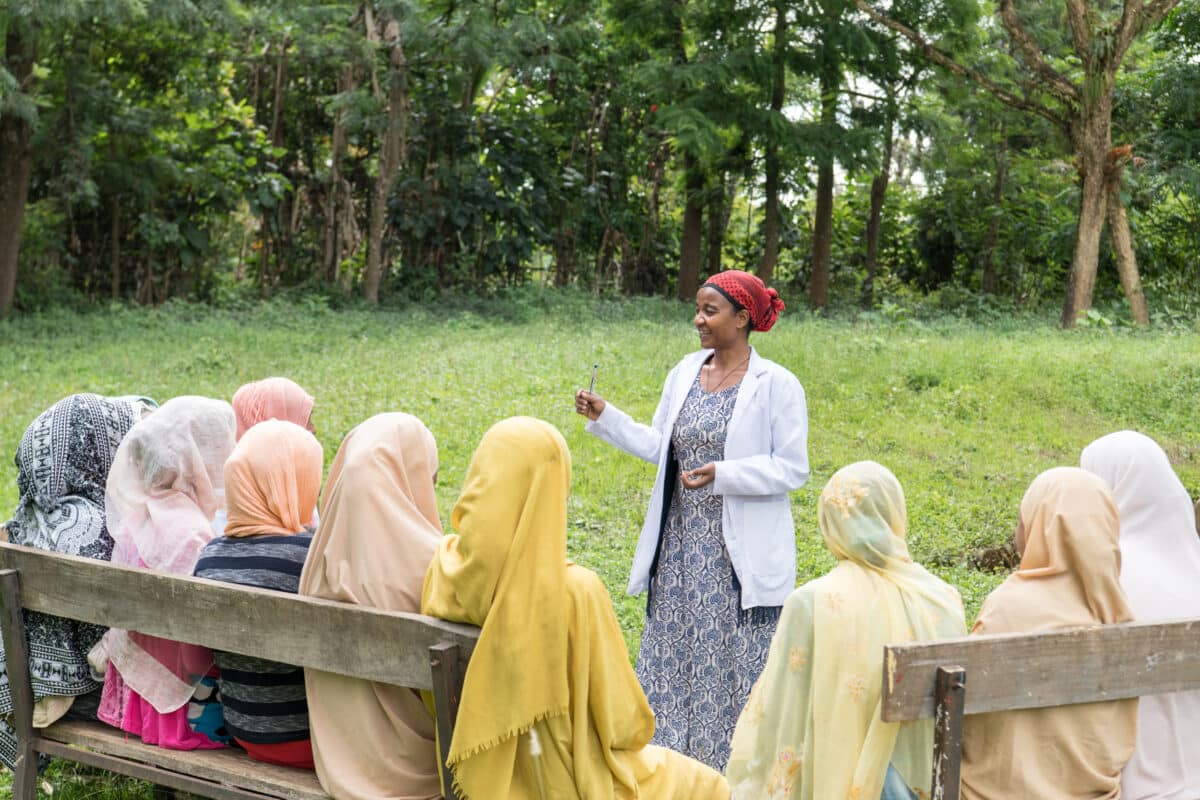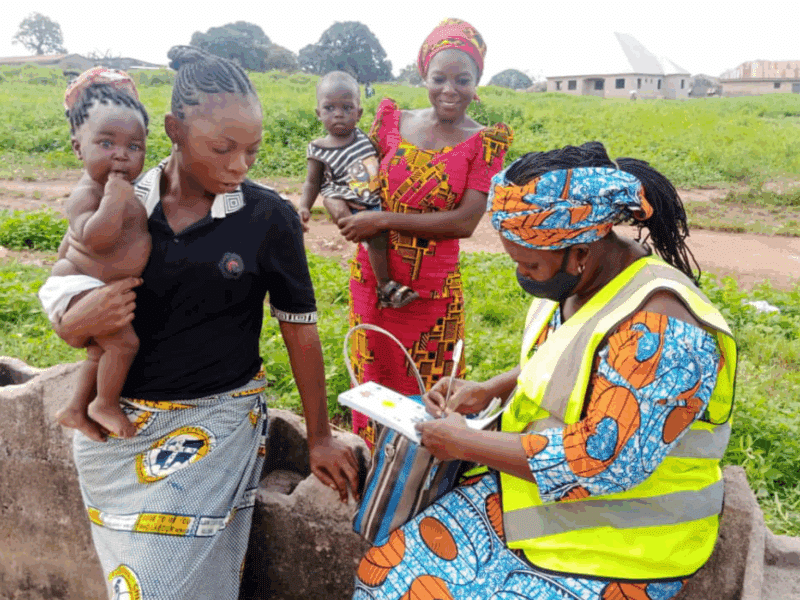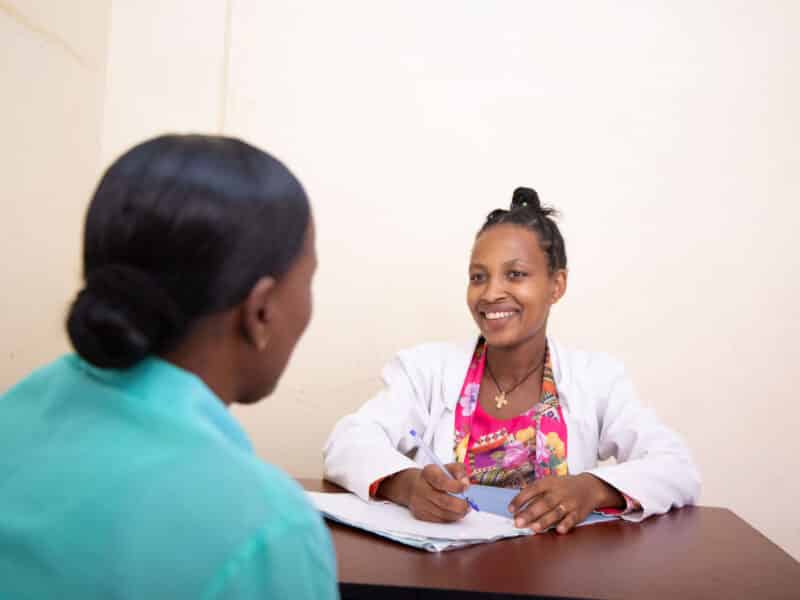A feasibility study of a small pilot program that incorporated a simplified version of Cognitive Behavior Therapy (CBT) into group sessions with postpartum Ethiopian women shows promise not only in alleviating symptoms of anxiety and depression but overcoming related barriers to using family planning in the early days of new motherhood.
Mothers’ Time, conducted by the Johns Hopkins Center for Communication Programs’-led Breakthrough ACTION project with its partner Camber Collective, began with 16 married women between the ages of 16 and 25, who had given birth in the previous year. The intervention was developed in collaboration with two Ethiopian partners, Dr. Tesera Bitew and Deep Dive Research & Consulting.
The women chosen for the program were not using modern contraception at the time and reported mild or moderate symptoms of depression or anxiety. The program trained Health Extension Workers (Ethiopia’s community health workers) to provide the three 90-minute sessions, which were built on the concepts of CBT, considered the gold standard in counseling, which works to modify beliefs and assumptions and can lead to positive changes in behavior and overall improvements to mental health.
The sessions were designed to help give women the skills to identify and question unhelpful thoughts, using stories which focused on how thoughts can impact mood and behaviors that are important for overall health. The group nature of the intervention allowed the women to discuss shared challenges and build social connections.
“There’s just not a lot of research out there about depression and anxiety with regard to reproductive health behavior,” said Breakthrough ACTION’s Sarah Burgess, an engagement manager for Camber Collective. “Depression and anxiety affect so many of the behaviors and skills that are important in the process of considering family planning use and acting on one’s fertility intentions. So, might feelings of depression and anxiety be getting in the way of those decisions? This project came out of a desire to contribute to what we thought was a gap in the literature.”
Postpartum family planning uptake in Ethiopia is low, with data from 2016 showing that only 25 percent of women use a method at six months after their babies were born. This is important because it is best to space the birth of children for a number of health and social reasons.
Most participants reported the intervention was helpful for managing feelings of stress or sadness. “The way I feel, and the peace of my mind has changed a lot,” one mother said after the sessions. “I am putting aside destructive thoughts. I am giving myself time. I am minimizing my stress level.”
While most women reported feeling better, researchers are unsure whether this was just a short-term impact. More work is needed to determine whether there are lasting effects and whether family planning uptake improved.
But the Mothers’ Time results so far have spurred an expansion of the program to include a fourth session with the women and to test it with a broader group. The second iteration includes 329 young moms with newborns from 24 communities.
The program is based on a World Health Organization CBT curriculum, and it’s not full-blown therapy, says CCP’s Dominick Shattuck, Breakthrough ACTION’s research, monitoring, evaluation, and learning director. “But it’s giving mothers skills to address the challenges around their mental health and how they feel that sadness and trying to encourage behaviors that will help to address their concerns and make them feel better in that context,” he says.
Each mother also got individual homework, which helped them prioritize caring for themselves and connecting with others.
One young mom said that Mothers’ Time motivated her to communicate with her husband, who had sympathy for her feelings of being overwhelmed with responsibilities and worries and agreed to take on more household responsibilities. She then had more time to care for herself and described increased motivation to visit a health care worker.
Another mother noted that she wanted to use family planning but had not yet made time to obtain a method. Later, in interviews, she noted that she and fellow mothers tended to keep their problems to themselves, but she realized this behavior “is not good for us, and we should discuss with health workers if we have issues or need help.”
While the intervention appeared helpful overall for supporting family planning choice, it is likely not appropriate for addressing all barriers. One woman, for instance, described deep religious barriers to family planning, which this intervention cannot address.
Adding programs like Mothers’ Time, says CCP’s Zoe Hendrickson, an associate scientist at the Johns Hopkins Bloomberg School of Public Health, could help break down some of the stigma about mental health, which exists not just in Ethiopia but around the world. She says they haven’t used words like depression and anxiety in the groups but instead translated them in terms of sadness.
“The availability of mental health services is really lacking,” she says. “And so even this very minor intervention would really greatly increase access to mental health services for new moms.”





